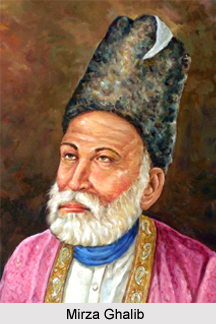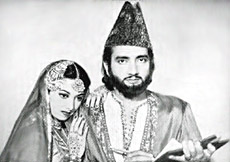 "Love knows no difference between life and death.
"Love knows no difference between life and death.
The one who gives you a reason to live is also the one who takes your breath away" ---- Mirza Ghalib.
One of the most dominating poets in Urdu language Mirza Ghalib with his sensitive mind and perceptive ideas has added a distinct flavor to Urdu and Persian literature. He is the painter of human emotion who with his imagery, vision, dream and idea weaves that magic dream love and languishes. Mirza Ghalib, the classical Urdu and Persian poet of the subcontinent wrote several ghazals, which in many different ways have been sung and interpreted. His geet and ghazals are an expression of his philosophy and ideas and his poems and verses are a reflection of the agony of life. His masterpieces will forever remain his supreme contribution to Urdu Poetry and Literature. Ghalib was unconventional without any scruples.
Mirza Asadullah Beg Khan was born on 27 December 1796 in the city of Agra. His father died while he was young and he spent his early boyhood with his mother`s family. He grew up in a relatively free environment from male domination. It accounts for his independent spirit, which he has shown from his childhood. He had a great knowledge of theology, classical literature, grammar and history. In 1810 at the age of thirteen he was married into a family of noble. He had seven children but no one survived. This pain has found in his ghazals also. He died in Delhi on 15th, 1869. His pen name was Asad drawn from his given name Asadullah Khan. He changed his `nom de plume` to Ghalib. From the research by scholars of Ghalib`s work, it raised that he use both the name interchangeably.
 Though Mirza Ghalib wrote in Persian, he is famous for his writing in Urdu. He wrote most of his Urdu ghazals by the age of nineteen though there is no such evident in support. His ghazals are not easily understood as they were written in highly Persianized Urdu. Ghalib`s ghazals were the expression of torment love. He incorporated philosophy, classical literature into it. In his ghazals the gender and the identity of beloved is indeterminate. It could be anything- women, a man or even the God. Ghalib`s poetry is an excellent illustration of love poems.
Though Mirza Ghalib wrote in Persian, he is famous for his writing in Urdu. He wrote most of his Urdu ghazals by the age of nineteen though there is no such evident in support. His ghazals are not easily understood as they were written in highly Persianized Urdu. Ghalib`s ghazals were the expression of torment love. He incorporated philosophy, classical literature into it. In his ghazals the gender and the identity of beloved is indeterminate. It could be anything- women, a man or even the God. Ghalib`s poetry is an excellent illustration of love poems.
Dr. Sarfaraz K Niazi was the first who made the English translation of Ghalib`s Poems. Before him letter writings were very ornamental. It is Mirza Ghalibs who wrote the letters in a very informal way. His letter`s laid the foundation of popular and easy Urdu. He himself was very witty and humorous. It reflected in his writings of letter. Ralph Russell has translated his letters in English very beautifully. Ralph Russell was also known as The Oxford Ghalib.
The film "Mirza Ghalib" was a tribute to him by the Indian Cinema in 1954. Ghalib`s compositions were used in that film as music and that remain everlasting favourites. Pakistan cinema has also paid tribute to this legendary poet through film named as "Mirza Ghalib". A TV serial by the famous writer and poet, Gulzar, was also produced.
It is impossible to say when Mirza Ghalib started writing. He began to take his careers in letters seriously. His contemporaries soon recognized him as genius. Bahadur Shah Zafar, the last Mughal King, appointed him to write the official history of the Mughal dynasty titled as "Partavistan" after the death of Zaug, the king`s tutor in the writing of poetry.
Ghalib`s life remained always curiously unfinished. He never had books of his own. Mirza Ghalib had many attitudes toward the British, most of them complicated and quite contradictory.



















